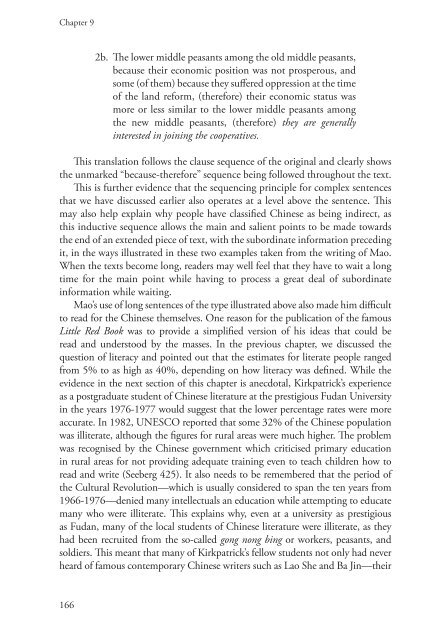Chinese Rhetoric and Writing - An Introduction for Language Teachers, 2012a
Chinese Rhetoric and Writing - An Introduction for Language Teachers, 2012a
Chinese Rhetoric and Writing - An Introduction for Language Teachers, 2012a
Create successful ePaper yourself
Turn your PDF publications into a flip-book with our unique Google optimized e-Paper software.
Chapter 9<br />
2b. The lower middle peasants among the old middle peasants,<br />
because their economic position was not prosperous, <strong>and</strong><br />
some (of them) because they suffered oppression at the time<br />
of the l<strong>and</strong> re<strong>for</strong>m, (there<strong>for</strong>e) their economic status was<br />
more or less similar to the lower middle peasants among<br />
the new middle peasants, (there<strong>for</strong>e) they are generally<br />
interested in joining the cooperatives.<br />
This translation follows the clause sequence of the original <strong>and</strong> clearly shows<br />
the unmarked “because-there<strong>for</strong>e” sequence being followed throughout the text.<br />
This is further evidence that the sequencing principle <strong>for</strong> complex sentences<br />
that we have discussed earlier also operates at a level above the sentence. This<br />
may also help explain why people have classified <strong>Chinese</strong> as being indirect, as<br />
this inductive sequence allows the main <strong>and</strong> salient points to be made towards<br />
the end of an extended piece of text, with the subordinate in<strong>for</strong>mation preceding<br />
it, in the ways illustrated in these two examples taken from the writing of Mao.<br />
When the texts become long, readers may well feel that they have to wait a long<br />
time <strong>for</strong> the main point while having to process a great deal of subordinate<br />
in<strong>for</strong>mation while waiting.<br />
Mao’s use of long sentences of the type illustrated above also made him difficult<br />
to read <strong>for</strong> the <strong>Chinese</strong> themselves. One reason <strong>for</strong> the publication of the famous<br />
Little Red Book was to provide a simplified version of his ideas that could be<br />
read <strong>and</strong> understood by the masses. In the previous chapter, we discussed the<br />
question of literacy <strong>and</strong> pointed out that the estimates <strong>for</strong> literate people ranged<br />
from 5% to as high as 40%, depending on how literacy was defined. While the<br />
evidence in the next section of this chapter is anecdotal, Kirkpatrick’s experience<br />
as a postgraduate student of <strong>Chinese</strong> literature at the prestigious Fudan University<br />
in the years 1976-1977 would suggest that the lower percentage rates were more<br />
accurate. In 1982, UNESCO reported that some 32% of the <strong>Chinese</strong> population<br />
was illiterate, although the figures <strong>for</strong> rural areas were much higher. The problem<br />
was recognised by the <strong>Chinese</strong> government which criticised primary education<br />
in rural areas <strong>for</strong> not providing adequate training even to teach children how to<br />
read <strong>and</strong> write (Seeberg 425). It also needs to be remembered that the period of<br />
the Cultural Revolution—which is usually considered to span the ten years from<br />
1966-1976—denied many intellectuals an education while attempting to educate<br />
many who were illiterate. This explains why, even at a university as prestigious<br />
as Fudan, many of the local students of <strong>Chinese</strong> literature were illiterate, as they<br />
had been recruited from the so-called gong nong bing or workers, peasants, <strong>and</strong><br />
soldiers. This meant that many of Kirkpatrick’s fellow students not only had never<br />
heard of famous contemporary <strong>Chinese</strong> writers such as Lao She <strong>and</strong> Ba Jin—their<br />
166


















